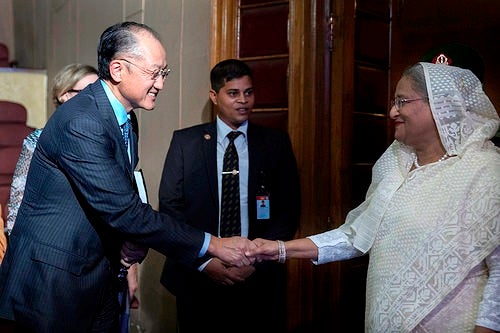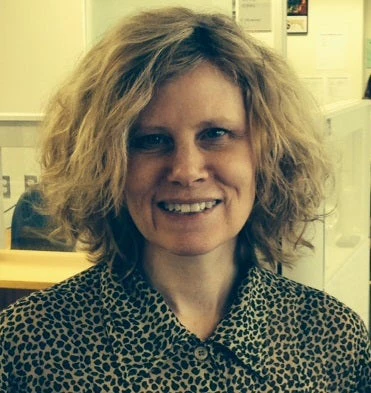Bangladesh Prime Minister Sheikh Hasina and World Bank Group President Jim Yong Kim celebrated Bangladesh’s dramatic progress fighting poverty on End Poverty Day, October 17, at a special event in the heart of Dhaka. More than 20 million people have lifted themselves out of poverty in Bangladesh in the last two decades. By 2010, the extreme poverty rate fell to 18.5 percent, down from 33.7 percent in 2000.
More than 20 million people have lifted themselves out of poverty in Bangladesh in the last two decades. By 2010, the extreme poverty rate fell to 18.5 percent, down from 33.7 percent in 2000.
Speaking in the Bangla language, the prime minister said Bangladesh’s journey has never been smooth, but strong leadership and the resilience of the population have helped it become a lower middle income country and a model for others to imitate.
“Our development has a human face and strives to protect and promote the livelihoods of poor and vulnerable groups,” Hasina said to an audience of ministers, politicians, non-governmental organizations, private sector, civil society, ambassadors, international development partners, the press, and the youth community.
She took stock of many development achievements, such as big drops in maternal and infant mortality rates, and said social safety nets, prudent macro-economic management, and policies to promote inclusive growth have been key to progress in Bangladesh.
Kim praised Bangladesh for getting “many of the basics right.” He said one lesson to draw from the country is that innovation plays a critical role in reducing poverty.
For example, Bangladesh’s national family planning program in the 1980s “created an army of women health workers” who went door to door to bring contraceptives to women, reducing fertility rates and sparking demographic transition.
In the 1990s, Bangladesh started a female secondary school stipend program – one of the first conditional cash transfers programs in the world – that helped drive primary school enrollment for girls. Today, the enrollment rate for girls is higher in Bangladesh than in Bhutan, Nepal and Pakistan, and about the same as in India, said Kim.
He said that Bangladesh was also ahead of its time by recognizing that investments in people are just as important as investments in so-called “hard infrastructure,” -- bridges, roads, and energy.
He announced the World Bank Group hopes to invest up to $1 billion in Bangladesh to address malnourishment among children and will announce a major investment to help the country adapt to climate change.
In addition, the Bank plans to establish a multi-donor trust fund to pass on the knowledge of successful poverty reduction experiences here to countries around the world, Kim said.
“Bangladesh’s impressive record in dramatically reducing extreme poverty gives us hope that this trend will continue and that other countries can do the same.”
World Bank Chief Economist Paul Romer said Bangladesh showed “it is possible to have more growth and more equality,”
“You do not face a tradeoff of growth versus equality. You have a chance to pursue growth via equality,” Romer said. “The highest returns may come from investing in the people who have the biggest opportunity to catch up with everyone else. All they need is a chance.”
The event also featured Bangladesh Finance Minister Abul Maal Abdul Muhith, World Bank Vice President, South Asia, Annette Dixon, and Bangladesh Senior Secretary, Economic Resources Division, Ministry of Finance, Mohammad Mejbahuddin.
A panel moderated by Shereen Bhan, managing editor, CNBC TV-18, explored issues ranging from women’s empowerment to urbanization and included Bangladesh Finance Minister Muhith, Bangladesh Speaker of the House Shirin Sharmin Chaudhury, Bangladesh Minister of Planning Mostafa Kamal, World Bank Chief Economist Romer, Action Aid Country Director Farah Kabir, and Managing Director, Mohammadi Group, Rubana Huq.
The event also unveiled a new song to mark End Poverty Day, by Bangladeshi singer-songwriter Habib Wahid.


Join the Conversation